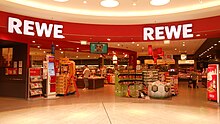History
REWE-Zentralfinanz eG forms the parent company of the co-operative, whilst the operational business is controlled by the subsidiary entitled REWE-Zentral AG. [1] The international business is bundled under the umbrella of Rewe International. [2]
The basis of the co-operative trade group consists of a network of independent retailers. Sales lines include Billa, Penny, Rewe, Toom, DER Touristik Germany, as well as ITS Reisen and Lekkerland. [3]
In the 2022 financial year, the REWE Group had total external sales of €84.4 billion. [4] The REWE Group is the second largest supermarket chain in Germany behind EDEKA.
1927–1945
In 1927, the Auditing Association of Westkauf Cooperatives, also known as Rewe, began offering purchasing services in Cologne. [5] Their aim was to promote independent retailers by facilitating collective bargaining at competitive rates. [6] Early product offerings most frequently traded included hazelnuts, dried apricots and raisins. [7] In order to gain further advantages, in the 1930s cooperatives began to influence the shop fittings and advertising of affiliated outlets, [8] this was accompanied by the introduction of uniform lettering to the affiliated outlets in 1932. [7]
In 1935, several purchasing cooperatives from Central Germany merged with Rewe. [7] To enable further growth, district centers were developed each of which, to this day, form the foundation of Rewe's business structure. [9] Alongside this, during the 1930s, Rewe gradually began to expand outside the traditional Rhenish-Westphalian area. In 1940, Rewe had a membership of 8,000 people with 106 cooperatives registered. [6] The Second World War had a disruptive effect on the trading group as essential goods had become scarce and many shop-owners had to go to the front for military service. To counter this, Rewe diversified into production. Subsequently, a significant part of their administration was destroyed by bombing resulting in the company being almost unable to function at the close of war. [10]
1946–1972
Following the end of the war, Rewe resumed activities in August 1945. After the wartime headquarters had been relocated to Fredeburg and Bödefeld due to the approaching front, Rewe returned to Cologne. The division of Germany into sectors resulted in restricted work and the gradual emergence of branches in West Germany and West Berlin. [10] Shortage of basic supplies such as sugar, prompted the introduction of the first trademarks in 1949, with Rewe Dreistern covering flour, salt and table oil, margarine being supplied under the Replica Kronjuwel brand. [11] [12] As reconstruction took place, Rewe became increasingly decentralised, and by 1960 their member companies had returned to over 100. [6]
Several takeovers of supermarkets and chains in the 1960s and 1970s led to a broad range of brands and formats. [6] In 1971, there were talks between Rewe and Edeka about a potential merger, which could have accounted for approximately 25% of the market. [13] [14] Ultimately, due to antitrust concerns, the project was not implemented. [15] In 1972, the partnership model still used today was introduced, following the previously independent regional cooperatives ceding management functions to Rewe headquarters in 1968. [15] The head office was converted into a joint-stock company whose wholesaler shareholders went on to manage all central services and sales promotion. [16]
Digital business
In 2013, the REWE Group founded a subsidiary named REWE Digital, which is responsible for all strategic online activities. [19] The group also acquired the e-commerce platform vendor commercetools [20] and ZooRoyal, an e-commerce website for animal food and pet supplies. [21] In 2017 REWE Group announced to make additional investments in the billions in order to further digitalize their business. [22] In 2020 REWE digital, for the first time, spun-off one of its business units and founded the independent company OC Fulfillment GmbH, vendor of the omnichannel fulfillment software-as-a-service platform fulfillmenttools. [23] In 2021 REWE Group announced the inception of Paymenttools, provider of on- and offline payment solutions for retailers. [24]
This page is based on this
Wikipedia article Text is available under the
CC BY-SA 4.0 license; additional terms may apply.
Images, videos and audio are available under their respective licenses.

